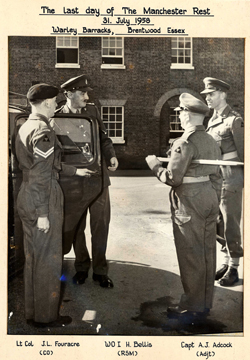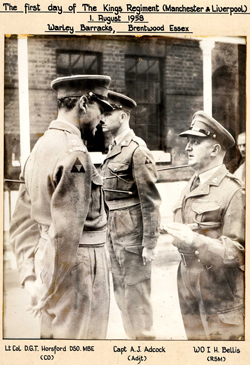Museum of the Manchester Regiment
History
1946 - 1958
In May 1947 Her Majesty Queen Elizabeth consented to become Colonel in Chief of the Regiment following HM King George V who had been Colonel in Chief from 1929 until his death in 1936.
Britain was drastically reducing her global commitments and combined with a period of decolonisation considerable reductions were made in the size of the armed forces. Accordingly the two regular army battalions of the Manchester Regiment were to become one and in May 1948 the 1st and 2nd Battalions amalgamated at Dunham Park Camp, Altrincham, Cheshire to form 1st Battalion Manchester Regiment (LXIII / XCVI). In this way ensuring that the traditions of both battalions would be carried on with the new battalion.
It was at Dunham Park on 1 June 1948 that the new 1st Battalion, together with the 8th and 9th Territorial Army Battalions of the Regiment, was inspected by HM Queen Elizabeth performing her first public role as Colonel in Chief. The long association of the Manchester Regiment as machine gunners ended with the amalgamation and the new 1st Battalion reverted to the role of a normal infantry battalion.
The new 1st Battalion, commanded by Lieut Colonel Charles Archdale, who had earlier commanded the 2nd Battalion in Burma, moved in July 1948 to Wuppertal in Rhine Army. While there the battalion settled down to an enjoyable life of infantry training, competitive shooting, much sport and a certain amount of internal security duty.
After the end of the war, Berlin had remained under the military government of the four powers, the Kommandatura. The Allies presence was the guarantee of West Berlin - as the American, British and French sectors of the city were known. Being the most sensitive flashpoint between East and West, post-war Berlin was the backdrop to crises and espionage giving the city a sinister glamour.
The first major crisis came with the Russian attempt to blockade the western sectors and o n 2 June 1948 the Soviet occupation troops halted all rail and road traffic between Berlin and the West. Less than one month's supply of food was available for the two million inhabitants of the city. The British, American and French garrisons remained in Berlin and the city was supplied by the Berlin Airlift during 1948/49. The Russians ended the blockade, conceding defeat on 12 May 1949.
The Manchester's moved to Berlin in April 1950, 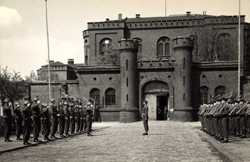 taking over Wavell Barracks in Spandau from the Royal Welch Fusiliers. A busy year was spent carrying out a complex mixture of guard and internal security duties. There were sporting activities in the Olympic Stadium, sailing on the lakes of Berlin and periodic duties guarding the seven leading Nazis held in Spandau Prison who had been sentenced by the international military tribunal at Nuremberg in 1946. Amongst the many visitors to the battalion was the Lord Mayor of Manchester, Alderman Colonel S P Dawson MM.
taking over Wavell Barracks in Spandau from the Royal Welch Fusiliers. A busy year was spent carrying out a complex mixture of guard and internal security duties. There were sporting activities in the Olympic Stadium, sailing on the lakes of Berlin and periodic duties guarding the seven leading Nazis held in Spandau Prison who had been sentenced by the international military tribunal at Nuremberg in 1946. Amongst the many visitors to the battalion was the Lord Mayor of Manchester, Alderman Colonel S P Dawson MM.
All this came to an end when the battalion left Berlin in April 1951. Their success in 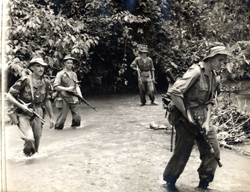 all fields, military and sporting was reflected in the message which Lieutenant Colonel George Frampton received from Lieutenant General Sir Charles Keightley, Commander in Chief Rhine Army:
all fields, military and sporting was reflected in the message which Lieutenant Colonel George Frampton received from Lieutenant General Sir Charles Keightley, Commander in Chief Rhine Army:
Your reputation stands higher than that of any other battalion under my command. I am proud to have had such troops in Germany and am delighted to know that you will still be under me in my next appointment. 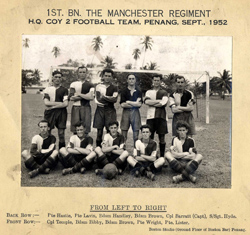
To UK ( Chester ) in April 1951. To Malaya and the Malayan Emergency on 30 May 1951. To UK and Formby in 1954. To Berlin in 1955 and to Minden, Westphalia in 1956. To UK and Brentwood in 1957 where in 1958 the battalion celebrated the bi-centenary of the formation of the 63rd Regiment from the 2nd Battalion of the 8th Regiment.
Amalgamation with the King's Regiment (Liverpool) took place at Brentwood in 1958.
